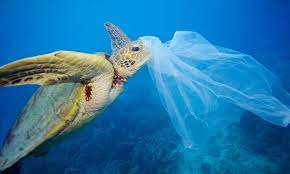Single-use plastic shopping bags are everywhere, with an estimated one to five trillion consumed around the world every year. Its popularity is attributed to its versatility. The bag is strong, waterproof, and lightweight. However, the incredible usage combined with the lack of recycling, with estimates as low as 1%, has led to significant pollution. Plastic debris and plastic bags are harming Earth’s natural systems, including the ocean and marine life. Researchers have found plastic rubbish and particles in all major ocean regions. Fish and turtles mistake plastic litter and bags as food, and plastic bags spoil marine ecosystems.
Plastic isn’t biodegradable; instead, it breaks down into smaller plastic particles called microplastics. Microplastics pollute the air, water and even our food. They have been found everywhere on the planet, including in fresh snowflakes in the Antarctic, and even in human placentas. Microplastics have been shown to cause damage to human cells. More research needs to be conducted to determine the overall health concerns caused by microplastics.
Closer to home, plastic bags accidentally discarded with bottles and cans at the Needham Transfer Station (RTS) create problems for the recycling process. Machines become clogged by the bags, which can force materials bound for recycling to be discarded. There is the added cost of time and money when machines need to be repaired. Watch the Plastic Waste Reduction Team’s PSA about this issue.


